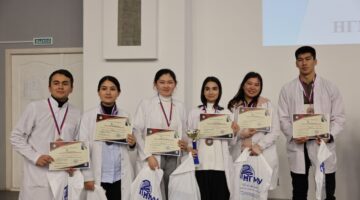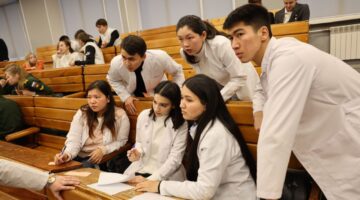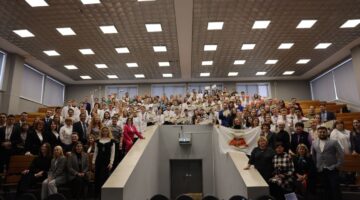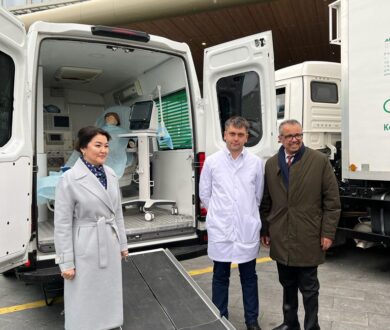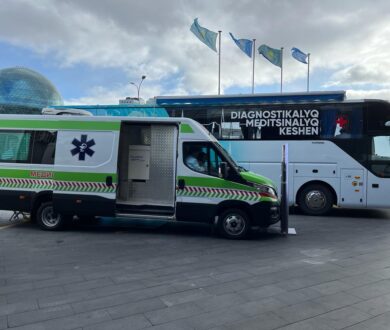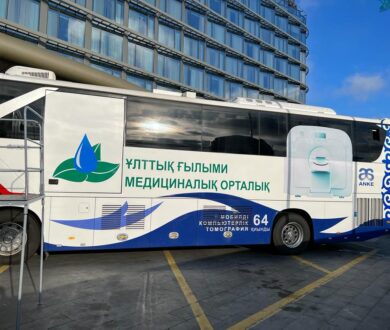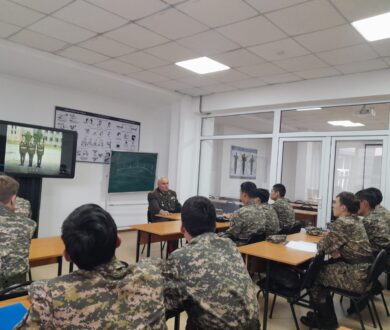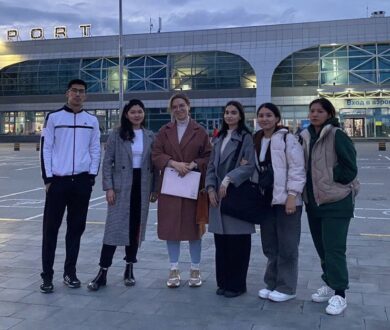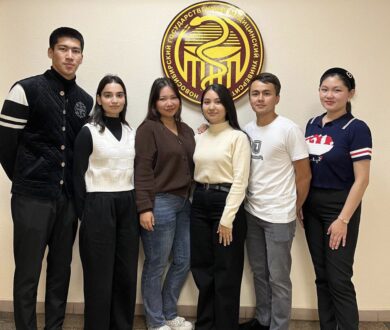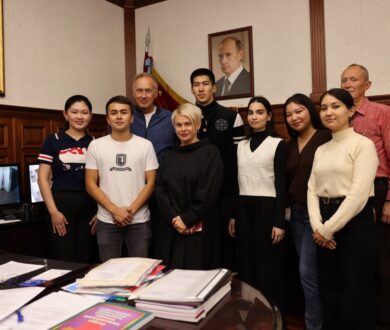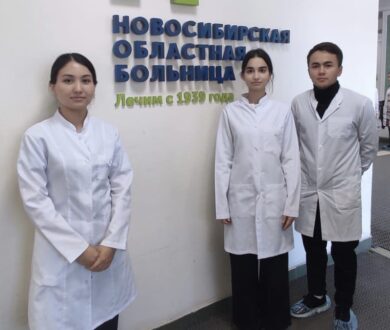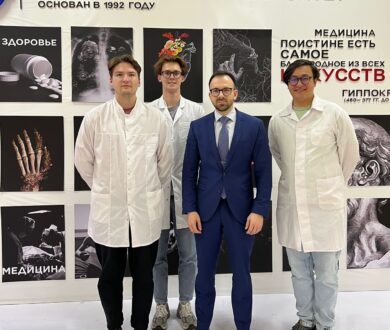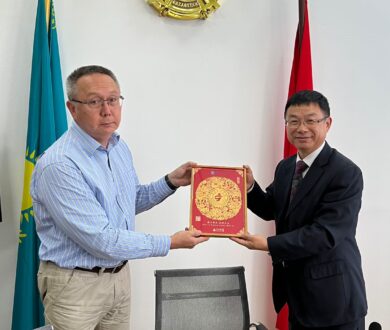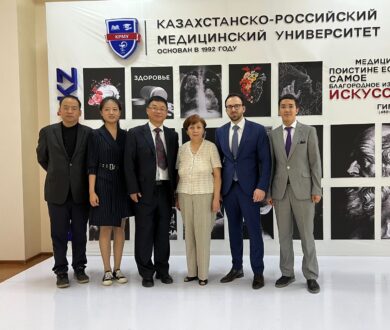The Kazakhstan-Russian Medical University announces the start of the inter-university competition “Medical excellence – 2024” in accordance with the recommendations of the Department of Science and Human Resources of the Ministry of Health of the Republic of Kazakhstan.
Competitive applications are accepted in two categories:
– “The best teacher at a medical university”;
– “The best scientist in healthcare”.
To participate in the competition, it is necessary to fill out the application form for the relevant nomination and send it to the email nauka@medkrmu.kz by May 10, 2024 (inclusive). The winner is determined by the candidate who receives the highest score in the relevant nomination (criteria are specified in the application form).
The winners of the inter-university stage must provide the following documents in electronic form by May 18, 2024 to participate in the republican competition:
1) application for participation in the competition in any form indicating the nomination;
2) resume with photo;
3) a professional activity report, certified by the head of the healthcare organization in which the contestant works, containing data on professional activities and information on the achievement of each of the indicators specified in the evaluation methodology for the relevant nomination (Information on the achievement of each of the indicators (criteria and indicators) is presented in a tabular format, according to the form specified in the evaluation methodology for the relevant nomination. The volume of the report should not exceed 15 printed pages);
4) video about the contestant (no more than 3 minutes).
For any inquiries, please contact the Department of Science and International Cooperation: nauka@medkrmu.kz, office. No. 804, +7 727 279-29-78.
At the regular meeting of the Scientific and Clinical Council (SCC) on March 1, 2024, plans for implementing the University’s initiative scientific research projects were presented:
1) Innovative method in the treatment of dentin caries in children with autism spectrum disorder
(State registration No. 0123RКI0377)
Project Leader: Jainakbayev Nurlan Temirbekovich
Co-leaders: Iskakova Mariyam Kozbaevna, Kuatbayeva Urnisyam Alimzhanovna
The project aims to study the application of air-abrasive (kinetic) tooth preparation method, which provides gentle, painless removal of affected tissues, and will help reduce the indicators of dental diseases, improve the quality of prevention and treatment of tooth decay in children with Autism Spectrum Disorder and the quality of their life.
2) Study of risk factors for the development of oral mucosal diseases among young individuals
(State registration No. 0123RКI0373)
Project Leader: Iskakova Mariyam Kozbaevna
Co-leader: Kuatbayeva Urnisyam Alimzhanovna
The aim of this project is to study the factors contributing to the development of oral mucosal diseases among young individuals.
3) Study of post-COVID syndrome in somatic diseases (State registration No. 0123RКI0374)
Project Leader: Jainakbayev Nurlan Temirbekovich
Responsible Executor: Mansharipova Almagul Tuleuovna
The aim of this interdisciplinary project, bringing together researchers from departments of general medical practice, internal medicine, neurology, infectious diseases, hygiene, and epidemiology, is to study the impact of post-COVID syndrome on the course of somatic diseases.
The implementation plans for the projects were unanimously approved by the members of the SCC. The research within the projects is scheduled to be conducted until the end of 2025.
For inquiries regarding the implementation of scientific projects and collaboration, please contact the Department of Science and International Cooperation. nauka@medkrmu.kz
More than 1 billion people around the world have at least one migraine attack each year.
Previous research shows that migraine can potentially increase a person’s risk for several health issues, including gastrointestinal conditions.
New research from Seoul National University College of Medicine in South Korea says there may also be a link between migraine and an increased risk for inflammatory bowel disease (IBD).
More than 1 billion peopleTrusted Source globally have at least one migraine attack each year.
Previous studies show that migraine can potentially increase a person’s risk for other conditions, including strokeTrusted Source, heart diseaseTrusted Source, epilepsyTrusted Source, sleeping issuesTrusted Source, and anxiety and depressionTrusted Source.
Migraine has also been linked to some gastrointestinal conditionsTrusted Source, including irritable bowel syndrome (IBS)Trusted Source.
Now, researchers from Seoul National University College of Medicine in South Korea say there may also be a link between migraine and an increased risk for irritable bowel disease (IBD), which is an umbrella term that includes Crohn’s disease and ulcerative colitis.
The study was recently published in the journal Scientific ReportsTrusted Source.
Migraine and IBD: An unsurprising connection
According to Dr. Brooks D. Cash, professor and chief of the division of Gastroenterology, Hepatology, and Nutrition at UTHealth Houston in Texas, who was not involved in this study, the field of gastroenterology has recognized for many years that migraine has been associated with many chronic gastrointestinal syndromes and diseases.
“The data in this report supports previous reports of an association between migraine headaches and IBD,” Dr. Cash told Medical News Today.
Dr. Rudolph Bedford, a board-certified gastroenterologist at Providence Saint John’s Health Center in Santa Monica, CA, who was also not involved in this study, told MNT that the research results were not surprising.
“[With] inflammatory bowel disease we do see some extra-intestinal manifestations including things involving the eye or ocular findings, which may be neurogenic in nature, so it wasn’t surprising,” Dr. Bedford added.
This is not the first study to look at a connection between migraine and IBD.
A study published in March 2021 of people in the United States found a higher prevalenceTrusted Source of migraine or severe headaches among adults with IBD than in those without.
Research published in March 2023 reported an increased prevalence of IBD in people with migraine with and without aura.
Could migraine increase risk of inflammatory bowel disease?
For the current study, researchers analyzed data from more than 10 million people through the nationwide healthcare system for South Korean citizens. About 3% of the study population had IBD.
Through the data, scientists found the incidence of IBD was significantly higher in people who had migraine compared to those who did not.
Scientists also reviewed the data through subgroups of Crohn’s disease and ulcerative colitis incidences. People with migraine in both subgroups had a higher risk of developing either condition when compared to people without migraine.
After a migraine diagnosis, researchers found people were at a higher risk of developing Crohn’s disease, with a significant rise after a 5-year follow-up.
Additionally, within the subgroups, scientists reported that the impact of migraine on the risk of developing ulcerative colitis was more prominent in men than women.
– Microplastics — tiny particles in the air, water, and soil — are increasingly found in drinking water and food supplies around the world.
– The effects of microplastics on humans have been studied and found to affect the composition and diversity of gut microbiomes.
– Researchers in China found that boiling hard tap water can produce calcium carbonate, which form crystallized encapsulations around microplastics that could be scraped or removed by pouring the water through a coffee filter.
– This technique removed up to 90% of the microplastics in samples of hard water and up to 25% of the microplastics in soft water.
Microplastics — tiny particles in the air, water, and soil — are an unfortunate byproduct of the globalized economy in a time that some researchers have defined as the Plastic AgeTrusted Source.
Defined by the United States National Oceanic and Atmospheric Administration (NOAA), the United Nations Environment Program (UNEP), and the European Chemicals Agency as particles under 5 millimeters (mm) long and insoluble in water, microplastics are increasingly prevalent in the Earth’s oceans, atmosphere, drinking water, and food supplies.
Some studies have examined the effects that microplastics have on the human gut microbiome. In 2022, researchers published a study in the journal NatureTrusted Source suggesting that “microplastic feeding affects both composition and diversity of colonic microbial communities.”
How to get rid of microplastics in water
While there are some water filtration systems that can reduce the number of microplastics in municipal drinking water supplies, a new study in the journal Environmental Science & Technology Letters suggests that boiling and filtering water — using the same methods and materials that one might use to make tea or coffee — could reduce 90% of free-floating nano- and microplastics (NMPs).
Researchers took samples of hard tap water from Guangzhou, China, and added different levels of NMPs to different samples, then boiled each sample for five minutes.
They found that crystalline structures of calcium carbonate — which occurs when boiling hard tap water since it is full of minerals — encapsulated the particles of MNPs.
Prof. Eddy Zeng, one of the study authors, said that these particles could build up over time and be scrubbed away; by pouring the rest of the water into a coffee filter, any remaining encrusted MNPs could be removed.
These methods showed that more encapsulation was visible in hard water, with 90% of MNPs removed from a sample that had 300 milligrams (mg) of calcium carbonate per liter. Soft water samples with less than 60 mg of calcium carbonate per liter showed a 25% reduction in MNPs through boiling.
How do microplastics affect the human microbiome?
Dr. Vincent Young, MD, Ph.D., professor of internal medicine and microbiology and immunology at the University of Michigan, who was not involved in the study, told Medical News Today that while studies have been conducted to establish the scope and effects of exposure to microplastics, nothing concrete has yet been established.
“There are multiple papers that suggest that the gut microbiome changes upon exposure to microplastics,” Dr. Young said. “That being said, it isn’t clear if these changes have a direct effect on human health. It should be noted that many things can alter the microbiome in the short run, again with unclear effects on human health.”
Melanie Murphy Richter, a registered dietitian nutritionist and the director of communications for Prolon, who was not involved in the study, told MNT that human gut development has changed as broader access to drinking water has evolved.
“The cells within our gut change every 3 days. That means that our gut composition will adapt and change in a matter of weeks (sometimes months) in favor of what we are exposed to most often,” Richter said.
Are there foods or supplements that can counter the effects of microplastics?
Any level of pre- or probiotic supplements can help regulate a healthy gut microbiome. Fermented foods like yogurt, sauerkraut, pickles, or kimchi can also be part of a good probiotic digestive regimen.
Richter added that fiber in foods like onions, asparagus, bananas, or buckwheat are prebiotics that feed the “good bacteria” that exist in the gut, and suggested that omega-3s in flaxseeds, walnuts, and mackerel can reduce inflammation.
Polyphenols in green tea, berries, or leafy greens can also fight against damage from microplastic consumption, she said, as can items like “binders.”
“Binders like activated charcoal, bentonite clay, or zeolite clay may help to bind to certain toxins and remove them from the body. Research on the efficacy of binders is still in its early stages but shows promise,” Richter said. “It’s important to remember not to take binders when you eat food, however, to avoid essential nutrients being removed from your body. Also, I recommend taking them with a big glass of water.”
Our students took part in the VIII International Morphological Scientific-Practical Conference of Students and Young Scientists ‘Morphological Sciences – Fundamental Basis of Medicine’ and the VII International Student Olympiad in Morphology at Novosibirsk State Medical University, where they secured the 3rd place. The students underwent training at NSMU as part of an academic mobility program; five fourth-year students of the General Medicine program were Shah Arbanur Davran, Abilkasym Tungyshbai Orazqanuly, Ochilova Shakhnozabonu Rakhmatullo kyzy, Nurgaliuly Baktykerei, and Baskanova Sandugash, along with a student from the Pharmacy program, Kadyr Diana Kanatkyzy.
On Monday, October 23rd, a plenary session of the Global Conference on Primary Health Care (PHC) dedicated to the 45th anniversary of the Alma-Ata Declaration and the 5th anniversary of the Astana Declaration on PHC took place in Astana.
More than 200 delegates from health ministries, development organizations, and World Health Organization representatives from around the world participated in this international event. Various aspects related to the interconnection between primary health care and universal health service coverage, PHC reforms in specific countries, primary level financing models, and other modern and significant topics were discussed during the working sessions.
The conference showcased various mobile complexes developed in the Republic of Kazakhstan, including a CT complex, a fluoroscopy complex, and a therapeutic complex. Our university also presented a mobile hemodialysis complex of its own development.
In accordance with the order of the Head of the Department of Defense Affairs of the city of Almaty , Colonel F.Kurmangazhinov, dated September 22, 2023, No. 191, was awarded military tickets and sergeant shoulder straps in the square in front of the monument to Amangeldy Imanov, the first graduate of the military department, 28 students of the Kazakh-Russian Medical University who completed military training under the reserve sergeants program.
The congratulatory speech and parting words were delivered by: veteran of the Armed Forces of the Republic of Kazakhstan, Major General Tuzikov V.V., Rector Professor Dzhainakbayev N.T., and Colonel of the reserve Userbayev A.S.
The solemn event continued at the military department of KRMU, where a “Round table” was organized and held – a meeting of students of the military department with Major General Tuzikov V.V., on the topic: “Formation of the Armed Forces of the Republic of Kazakhstan”. Then the patriotic film “October 25 – the Day of the Republic of Kazakhstan” was shown.
Within the framework of the academic mobility program for the winter semester of this year, 6 students from KRMU were sent to Novosibirsk State Medical University. Five fourth-year students of the «General Medicine» educational program – Shakh Arbanura Davran, Abilkasym Tungyshbay Orazqanuly, Ochilova Shakhnozabonu Rakhmatullo kyzy, Nurgaliuly Baqtykerey, and Sandugash Baskanova, along with a student from the «Pharmacy» educational program – Qadyr Diana Qanatqyzy. Our university wishes them interesting, productive, and enlightening days in the city of Novosibirsk.
We are pleased to welcome three institute learners from the Federal State Budgetary Institution “National Medical Research Center named after V.A. Almazov” of the Ministry of Health of Russia in St. Petersburg, who have come to our university as part of an academic mobility program. Matvey Laptev Igorovich and Maxim Borodin Andreevich, both fourth-year students in the General Medicine program, and Arthur Akino Daniil, a second-year PhD program participant in the Pathological Physiology program, will continue their studies at KRMU for one semester. The university wishes these young men success in achieving all their goals and also pleasant, productive, and warm days in Almaty.
On September 29, 2023, a delegation from “Ningxia Medical University” of the People’s Republic of China was received. The delegation included Wu Chuan – the secretary of the party branch, Wang Bingqi – a specialist from the admission office, and Wang Rui – the Deputy Secretary-General of the “Sino-North Africa Education Innovation Association. During this meeting, possible developments for further cooperation were discussed. The Kazakhstan-Russian Medical University wishes the guests success and fruitful days in Almaty.


